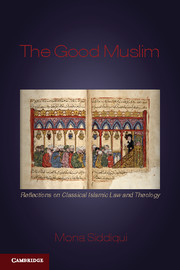Book contents
- Frontmatter
- Contents
- Acknowledgements
- Introduction
- 1 Spoken, Intended, and Problematic Divorce in Hanafī Fiqh
- 2 Between Person and Property: Slavery in Qudūrī’s Mukhtaṣar
- 3 Pig, Purity, and Permission in Mālikī Slaughter
- 4 Drinking and Drunkenness in Ibn Rushd
- 5 Islamic and Other Perspectives on Evil
- 6 The Language of Love in the Qur’ān
- 7 Virtue and Limits in the Ethics of Friendship
- Glossary
- Bibliography
- Index
- References
2 - Between Person and Property: Slavery in Qudūrī’s Mukhtaṣar
Published online by Cambridge University Press: 05 July 2012
- Frontmatter
- Contents
- Acknowledgements
- Introduction
- 1 Spoken, Intended, and Problematic Divorce in Hanafī Fiqh
- 2 Between Person and Property: Slavery in Qudūrī’s Mukhtaṣar
- 3 Pig, Purity, and Permission in Mālikī Slaughter
- 4 Drinking and Drunkenness in Ibn Rushd
- 5 Islamic and Other Perspectives on Evil
- 6 The Language of Love in the Qur’ān
- 7 Virtue and Limits in the Ethics of Friendship
- Glossary
- Bibliography
- Index
- References
Summary
Slavery and freedom are intimately connected, that contrary to our atomistic prejudices it is indeed reasonable that those who most denied freedom, as well as to those to whom it was most denied, were the very persons most alive to it. Once we understand the essence and the dynamics of slavery, we immediately realize that there is nothing in the least anomalous about the fact that an Aristotle or a Jefferson owned slaves. Our embarrassment springs from our ignorance of the true nature of slavery.
(Orlando Patterson)The analysis of divine law in the Islamic context took place primarily in the literary genre known as furū‘ al-fiqh (branches of jurisprudence). Works of furū‘ can be classified in two categories, mukhtaṣars or epitomes of the law and mabsūṭs or expansums. When writing my Ph.D. thesis on the Fatāwā ‘Alamgīrī, I was directed to the Mukhtaṣar of Aḥmad b. Muḥammad al-Qudūrī (d. 428/1037) as a text containing a succinct exposition of the Ḥanafī laws of marriage. I found the text to be very concise and clear in elucidating the major issues around marriage as a contract. The style was one of offering the rules rather than discussing points of disagreement. Yet I did not return to the Mukhtaṣar after the initial analysis of marriage laws. In his later work on form and content of furū‘ texts, my supervisor, the late Norman Calder, describes this particular mukhtaṣar (also called matn or text) as ‘the finest of the Ḥanafī mukhtaṣars’ which was ‘for centuries a teaching tool, a point of reference and a focus of commentary, due to its reliability as an expression of the basic norms of the Ḥanafī tradition’.
- Type
- Chapter
- Information
- The Good MuslimReflections on Classical Islamic Law and Theology, pp. 36 - 66Publisher: Cambridge University PressPrint publication year: 2012



